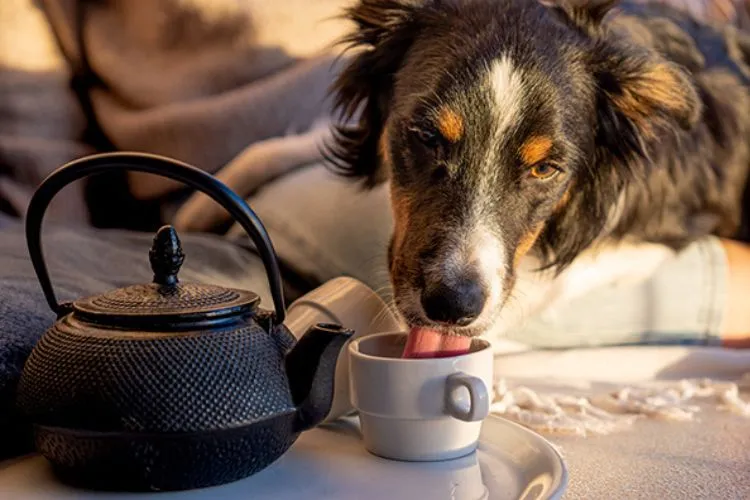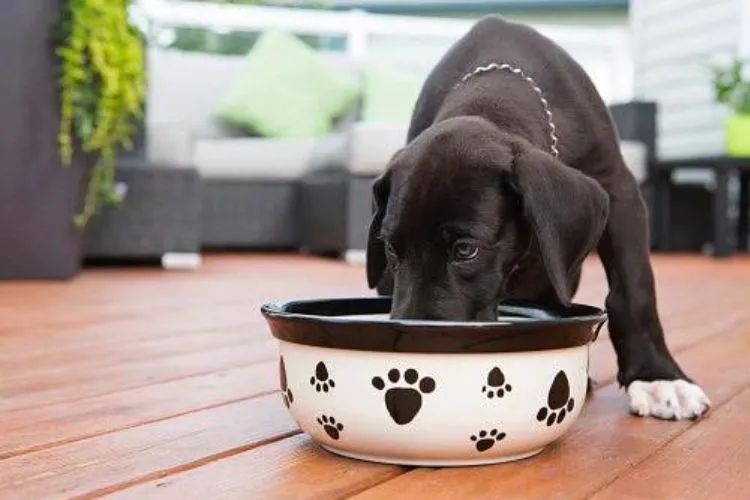Matcha, a finely ground powder made from specially grown and processed green tea leaves, has become increasingly popular worldwide due to its health benefits for humans. But when it comes to our furry friends, the question arises: Can dogs eat matcha?
This article delves into the potential benefits and risks of feeding matcha to dogs and provides professional advice for pet owners.
🐾 Can Dogs Have Matcha?
When considering whether dogs can have matcha, the primary concern is its caffeine content. Dogs are more sensitive to caffeine than humans, and even small amounts can be harmful.

Matcha contains less caffeine than coffee but more than regular green tea, making it potentially dangerous for canine consumption.
🐾 Potential Health Benefits of Matcha for Dogs
Matcha is revered for its high concentration of antioxidants, particularly catechins, which are more abundant than in other forms of green tea due to its unique cultivation and preparation methods.
In humans, these antioxidants are known to combat free radicals, reducing oxidative stress and potentially lowering the risk of chronic diseases. For dogs, antioxidants can similarly support overall health by boosting the immune system, improving heart health, and possibly slowing the aging process.
The specific antioxidants in matcha, such as epigallocatechin gallate (EGCG), have been studied for their anti-inflammatory properties, which can be beneficial in reducing chronic inflammation in dogs, a common cause of many canine health issues.
Furthermore, matcha contains L-theanine, an amino acid that promotes calmness and well-being, which could potentially help reduce anxiety and improve mood in dogs.
However, it’s essential to note that while these components offer significant health benefits, the research on matcha’s effects on dogs is limited. The beneficial components must be balanced against the potential risks, particularly the caffeine content.
If considering any form of green tea for a dog’s diet, it should be done under the guidance of a veterinarian and in forms that contain negligible to no caffeine.
🐾 Potential Risks and Side Effects of Matcha for Dogs
The primary concern with feeding matcha to dogs is its caffeine content. Dogs are significantly more sensitive to caffeine than humans, and even small amounts can lead to caffeine poisoning, a serious medical condition. Unlike humans, dogs do not metabolize caffeine as efficiently, which can result in prolonged and intensified effects.
Symptoms of caffeine poisoning in dogs can vary based on the amount ingested and the size and health of the dog. Initial signs include restlessness, hyperactivity, and rapid breathing.

As caffeine toxicity progresses, dogs may experience heart palpitations, which can feel like a rapid or erratic heartbeat, and muscle tremors, which are involuntary muscle movements or shaking.
In more severe cases, caffeine poisoning can escalate to seizures, a loss of muscle control and consciousness, which can be terrifying for both the dog and the owner.
In the worst scenarios, if a large amount of caffeine was ingested and treatment is not sought promptly, it can lead to death due to cardiac arrhythmias or severe neurological symptoms.
For these reasons, even small quantities of matcha could be dangerous, particularly for small breeds, puppies, or dogs with pre-existing health conditions. If a dog ingests matcha or any caffeine-containing product, it is critical to contact a veterinarian immediately.
Treatment for caffeine poisoning typically involves supportive measures such as inducing vomiting, administering activated charcoal to absorb the toxin, and providing intravenous fluids to help flush the caffeine out of the system.
In conclusion, while the antioxidant properties of matcha might suggest potential health benefits, the risks associated with caffeine content far outweigh these benefits when it comes to dogs. It is advisable to avoid giving matcha to dogs altogether and to consult with a veterinarian for safer alternatives to support your dog’s health.
🐾 Safe Alternatives to Matcha for Dogs
For pet owners looking to provide their dogs with similar health benefits without the risks, there are safer alternatives. Dog-friendly teas, like caffeine-free herbal blends, can offer some of the soothing effects without the dangers of caffeine.
Supplements specifically designed for dogs, containing antioxidants, can also be a safe way to boost their health.
🐾 How to Safely Introduce New Foods to Your Dog’s Diet
Introducing new foods to your dog’s diet should be done gradually. Start with small amounts and observe your dog for any signs of adverse reactions, such as gastrointestinal upset or allergic symptoms.

Always consult with your veterinarian before adding new foods to your dog’s diet, especially if they have existing health issues or dietary restrictions.
🐾 Professional Advice
Consulting with a veterinarian is crucial before introducing any new food items, including matcha, into your pet’s diet. If your dog accidentally consumes matcha, it’s important to watch for symptoms of caffeine poisoning and contact your vet immediately.
Veterinary professionals can provide guidance based on your dog’s specific health profile and dietary needs.
🐾 Pro Tips
When introducing new foods to your dog, always supervise their reaction and start with small amounts. Remember that what is natural for humans is not always safe for pets.
Tailor any dietary changes to your dog’s individual health needs, considering their age, size, and any pre-existing conditions.
You may also find interesting: Can Dogs Eat Hearts of Palm? | Can dogs eat pierogies?
🐾 Frequently Asked Questions (FAQs)
Even small amounts of matcha can be harmful to dogs due to its caffeine content. It’s best to avoid giving any matcha to your dog.
Matcha-flavored treats or ice cream can still contain caffeine, which is dangerous for dogs. It’s safer to stick to dog-specific treats without caffeine.
If your dog accidentally consumes matcha, monitor them closely for any signs of caffeine poisoning and contact your veterinarian immediately.
Yes, there are dog-friendly, caffeine-free herbal teas designed specifically for canine consumption. Always check with your vet before introducing these to your dog’s diet.
Symptoms of caffeine poisoning in dogs include restlessness, rapid breathing, heart palpitations, and tremors. Treatment typically involves veterinary care to support the dog’s heart and nervous system.
Conclusion:
While matcha may offer numerous health benefits for humans, its caffeine content makes it unsuitable and potentially dangerous for dogs.
Pet owners should exercise caution and seek safe alternatives to ensure their furry friends receive appropriate nutrition without the risks. Always consult with a veterinarian when considering new dietary options for your pet.
